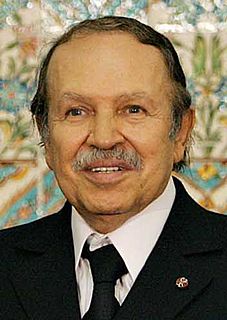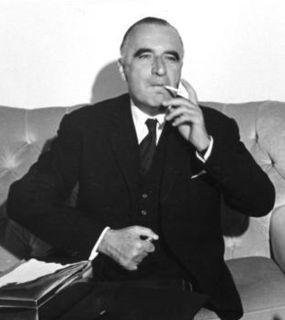
Politics of Algeria takes place in a framework of a constitutional semi-presidential republic, whereby the President of Algeria is head of state while the Prime Minister of Algeria is the head of government. Executive power is exercised by the government. Legislative power is vested in both the government and the two chambers of parliament, the People's National Assembly and the Council of the Nation. A legacy of Algeria's bloody War of Independence from France is a powerful military and security apparatus that put a high value on secrecy. Since 1988, parties other than the ruling FLN have been allowed and multiparty elections have been held, but freedom of political speech, protest and assembly is circumscribed, and the 2014 presidential election was boycotted by major opposition parties. Algeria has been called a "controlled democracy", or a state where the military and "a select group" of unelected civilians—reportedly known to Algerians as "le pouvoir" —make major decisions, such as who should be president.
The History of Algeria from 1962 to 1999 includes the period starting with preparations for independence and the aftermath of the independence war with France in the 1960s to the Civil War and the 1999 presidential election.

The President of Algeria is the head of state and chief executive of Algeria, as well as the commander-in-chief of the Algerian People's National Armed Forces.

The Democratic National Rally is a political party in Algeria. It is led by the Prime Minister Ahmed Ouyahia. The party held its Second Congress on 15–17 May 2003.

The Movement for the Society of Peace is an Islamist party in Algeria, led until his 2003 death by Mahfoud Nahnah. Its current leader is Bouguerra Soltani. It is aligned with the international Muslim Brotherhood.

The Islamic Salvation Front was a Sunni Islamist political party in Algeria. The party had two major leaders representing its two bases of its support. Abbassi Madani appealed to pious small businessmen, and Ali Belhadj appealed to the angry, often unemployed youth of Algeria.

Presidential elections were held in Algeria on 8 April 2004. Incumbent President Abdelaziz Bouteflika was re-elected with 85% of the vote.

The Algerian Civil War was an armed conflict between the Algerian Government and various Islamic rebel groups which began in 1991 following a coup negating an Islamist electoral victory. The war began slowly as it first appeared the government had successfully crushed the Islamist movement, but armed groups emerged to fight jihad and by 1994, violence had reached such a level that it appeared the government might not be able to withstand it. By 1996–7 however it became clear that the violence and predation of the Islamists had lost its popular support, although fighting continued for several years after.

Presidential elections were held in Algeria on 16 November 1995, in the midst of the Algerian Civil War. The result was a victory for Liamine Zeroual, head of the High Council of State at the time, who won 61% of the vote. The Armed Islamic Group of Algeria threatened to kill anyone who voted, with the slogan "one vote, one bullet", but (official) voter turnout was 74.9%.

Parliamentary elections were held in Algeria on 5 June 1997. The result was a victory for the National Rally for Democracy (RND), a new party created in early 1997 for President Zéroual's supporters, which won 156 out of 380 seats. They were followed by the Movement of Society for Peace with 69 seats, the FLN (62), and the Islamist Ennahda (34). The two Berberist parties, FFS and RCD, got 20 and 19 seats respectively. Views on this election were mixed; most major opposition parties filed complaints, and the success of the extremely new RND raised eyebrows. The RND, FLN, and MSP formed a coalition government, with the RND's Ahmed Ouyahia as prime minister.

French legislative elections took place on 18 November and 25 November 1962 to elect the second National Assembly of the Fifth Republic.
El Moudjahid is an Algerian French-language newspaper. It was founded during the Algerian War to inform FLN resistance fighters, and after independence it became the newspaper of the single-party FLN government. Since the FLN was voted out of power in 1991, the newspaper is no longer affiliated with that party.

Legislative elections were held in Algeria on 17 May 2007. 24 political parties and around 100 independent lists with a total of more than 12,000 candidates competed for the 389 seats in the National People's Assembly. While most Algerians voted on May 17, immigrants from Algeria to other countries and Algerians living in the Sahara and other nomads and semi-nomads voted on May 16 due to the distance from Algiers, the country's capital.

The 2002 Algerian Legislative election was held in Algeria on 30 May 2002 to elect members of the People's National Assembly. The governing National Liberation Front (FLN) won a majority of seats in the election. The election suffered from a low turnout, violence and boycotts by some opposition parties.

A constitutional referendum was held in Algeria on 23 February 1989. Coming after the 1988 October Riots, the new constitution removed references to socialism and allowed for multi-party democracy. Despite calls for a boycott by radical Islamists and opposition from trade unions and FLN members, the amendments were approved by 73.4% of voters with a 79% turnout. Local elections were scheduled for the following year, with parliamentary elections to be held in 1991.

Parliamentary elections were held in Algeria on 5 March 1982. The country was a one-party state at the time, with the National Liberation Front (FLN) as the sole legal party. The FLN nominated 846 candidates for the 282 seats, with voters asked to express their preference by crossing out names on the ballot. Only 69 of the 136 incumbents who ran for re-election were successful. Voter turnout was 67.34%.

Parliamentary elections were held in Algeria on 20 September 1964. The country was a one-party state at the time, with the National Liberation Front as the sole legal party. As a result, the election took the format of a yes or no vote on the FLN. Voter turnout was 85%.

A legislative election was held in Algeria on 10 May 2012. The incumbent coalition, consisting of the FLN of President Abdelaziz Bouteflika and the RND of Prime Minister Ahmed Ouyahia, held on to power after winning a majority of seats. The Islamist parties of the Green Algeria Alliance lost seats.

The Algerian Movement for Justice and Development is a political party in Algeria.












